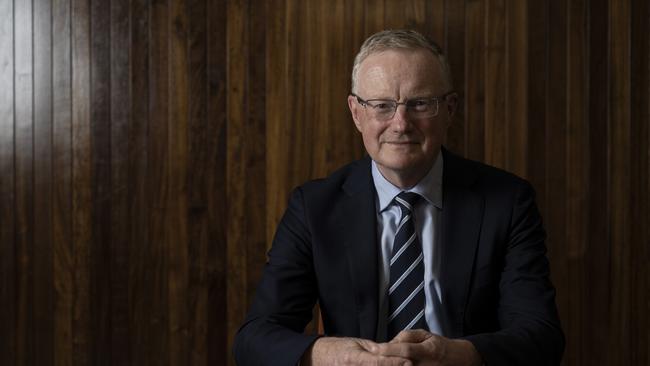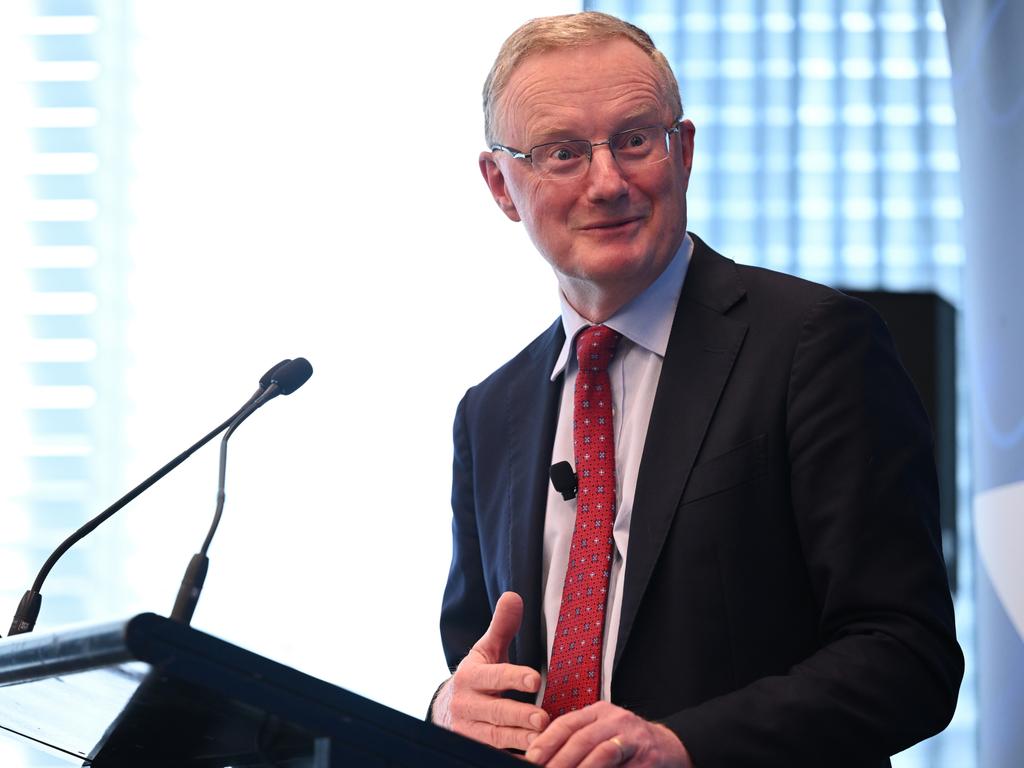RBA allays fears of rapid rise of interest rates
The Reserve Bank has given anxious borrowers hope it won’t accelerate monetary policy tightening again next month.

Business
Don't miss out on the headlines from Business. Followed categories will be added to My News.
The Reserve Bank has given anxious borrowers hope it won’t accelerate monetary policy tightening again next month, even though it indicated rates would continue to rise and the RBA would “do what is necessary” to ensure that inflation returns to the 2 to 3 per cent target range over time.
Answering questions after his speech to the American Chamber of Commerce in Australia, RBA governor Philip Lowe pushed back against market pricing of aggressive rate hikes, saying that while the market has been more accurate in recent times, the trajectory of hikes implied by the pricing is “not particularly likely”.
Market pricing for a cash rate near 4 per cent by year’s end implied the fastest and sharpest rate hike trajectory under the inflation-targeting regime, the RBA governor noted.
Up until October, the RBA’s “central scenario” was that its inflation pre-condition for rate hikes – inflation rising sustainability to within its 2 to 3 per cent range – would not be met before 2024.
As recently as March, it said it was prepared to be patient on rates as it monitored inflation.
In his AMCHAM speech Lowe reiterated guidance attached to rate hikes in the past two months – the first since 2010 – and said: “Australians should be prepared for more interest rate increases.”
“The level of interest rates is still very low for an economy with low unemployment and that is experiencing high inflation,” he added. But the RBA governor implicitly ruled out a rate hike as big as the 75 basis point increase in the US last month, which had started to be seen as priced in for Australia.
“I expect that next month we’ll be having the same discussion at our board meeting – 25 or 50 basis points,” he said in answer to a question.
“That’s what we discussed last time and that’s what we will discuss this time. At the moment I think that will be the decision we’ll be taking – 25 or 50 in the next meeting.”
Market pricing on Monday implied a 76 per cent chance of a 75 basis point rate hike next month.
However, that shifted down after Dr Lowe’s speech to an 88 per cent chance of 50 points.
The market implied a 3.59 per cent cash rate target at year’s end, down from 3.82 per cent Monday.
Dr Lowe also said he didn’t expect a recession in Australia over the coming years – not that central bankers are typically inclined to predict recessions.
“I don’t see a recession on the horizon here,” Dr Lowe said.
He noted that the unemployment rate was the lowest in nearly 50 years, labour market participation was the highest ever, more working-age Australians were in employment than ever before, job vacancies were at a record high, and households had strong savings buffers. Additionally, commodity prices had pushed the terms of trade to record levels.
“Australia has a lot of positives, so we don’t see a recession on the horizon,” Dr Lowe said.
“But if the last two years have taught us anything, you can’t rule anything out.”
The comments came as Deutsche Bank Australia chief economist Phil O’Donoghue predicted a recession in 2023 after concluding that a “contractionary policy stance looks necessary” to control inflation, with the cash rate likely to hit 3.1 per cent by the end of 2022. In his view, such a sharp rise in the cash rate from the current level of 0.85 per cent – implying an increase of 2.25 per cent or an average of 0.375 per cent at each of the next six meetings – will lift the unemployment rate by 1 percentage point by the end of 2023.
“That increase in unemployment, if realized, will be enough for us to call a recession in 2023, and will likely prompt the RBA to begin easing in Q4 2023,” Mr O’Donoghue said.
A “contractionary policy stance” on monetary policy should see unemployment begin to rise by the June quarter of 2023, and he expects it to hit 4.75 per cent by the end of 2023.
“That is similar to the policy-induced recession seen in Australia in 2000,” he said.
According to Mr O’Donoghue, a 1 percentage point rise in the unemployment rate within a year would mark a recession, even if Australia manages to avoid two consecutive quarters of negative growth, which was “not a rational recession definition for a country like Australia”.





